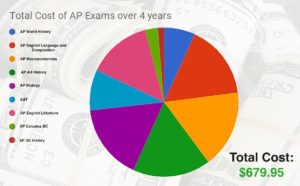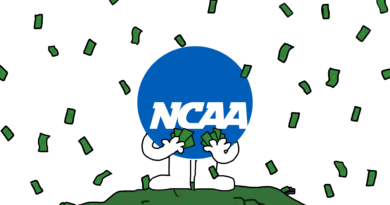Bored of College Board?
Every May thousands of students across the world file into testing rooms to take their AP exams in hopes of receiving college credit. Additionally, tens of thousands of high school juniors register for the SAT, a test required for admission at most post-secondary institutions. While companies like the Princeton Review, McGraw-Hill, and Barron’s AP Review do make money off of the exams through the sale of review books, one company stands above the rest with their profits — College Board.
College Board considers itself to be “not-for-profit.” However, in 2006 the corporation ended the year with a $55.1 million surplus. College Board pays their CEO more per year than Harvard pays their president, with a package of $1.3 million/year compared to the $874,559 to Harvard President Drew Faust in 2009. However, College Board has not always been as successful.
In 1999 the former governor of West Virginia Gaston Caperton came to the company to solve cash-flow issues. Caperton was wildly successful during his time at College Board, increasing the number of student test-takers from 3 million to 7 million by the time he stepped down as President of the company in 2012.
College Board claims they are dedicated to “expanding access to higher education for the poor, African-Americans, and Hispanics.” While they do admittedly provide fee waivers for both the SAT and AP exams, there are no fee waivers for the necessary study materials and the extra fees for score verification, rush order score reports, and other options. This places many of these minority groups at a disadvantage when  College Board aims to create testing equality for everyone because even if the student can afford to take the exam, they won’t have all the necessary materials to do well. Over four years in high school I have spent $126.95 on study materials alone. For some families, that can be a lot of money for some families, and it might mean giving up other necessities like food or new clothing.
College Board aims to create testing equality for everyone because even if the student can afford to take the exam, they won’t have all the necessary materials to do well. Over four years in high school I have spent $126.95 on study materials alone. For some families, that can be a lot of money for some families, and it might mean giving up other necessities like food or new clothing.
During Caperton’s stint as CEO he tripled the number of low income students to take at least one AP exam, and while that is a positive change, the number of low income students scoring high on the AP exams has not changed, likely because of the cost of study materials.
By leaving these groups out, College Board is putting minority students at a disadvantage for college admissions according to former teacher John T. Tierney, a current writer for The Atlantic.
Tierney states that “Increasingly, students don’t receive college credit for high scores on AP courses…[but] simply are allowed to opt out of the introductory sequence in a major…[which] more and more students say [is] a bad idea.”
While the goal of AP exams is for students to earn college credit, many students may find themselves in an advanced class without the knowledge from the introductory class because they took the AP class two years ago, placing them at a disadvantage in comparison to those who come from the intro class.
Aside from the ACT, College Board has a complete monopoly on tests. The majority of colleges or universities require potential students to submit an SAT or ACT score to accompany their application. However, the student needs to select the colleges which they send their SAT scores to within nine days of the test, or else they will have to pay $12 per score report needed.
According to the most recently available form 990 for College Board, the corporation raked in $720.65 million in revenue, and after expenses, they were left with a profit of $684.98 million, 9.9% of which comes from AP exam fees. This profit margin has been highly criticized by Americans for Educational Testing Reform (AETR). Their website reports that Caperton made 444% of the industry average in compensation every year. The former College Board CEO Caperton was compensated $872,061 per year, which is twice the annual salary of the President of the United States ($400,000).
Despite the College Board’s questionable non-profit status, they still stand among the “Big Three” of standardized testing, alongside ETS and ACT. College Board will only fall from their pedestal when (or if) colleges stop requiring the SAT for their applications. But until then, students will continue to pay hundreds of dollars for a chance of getting into a good college.




